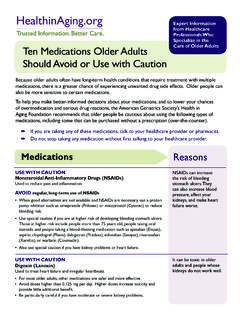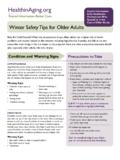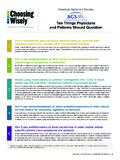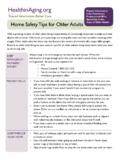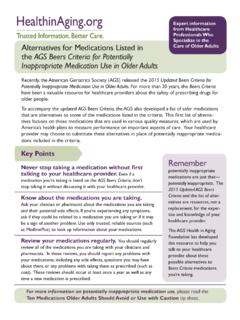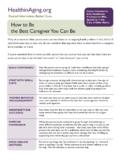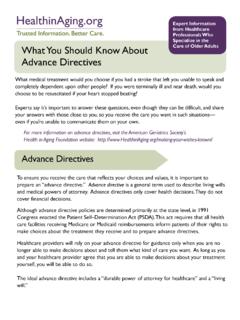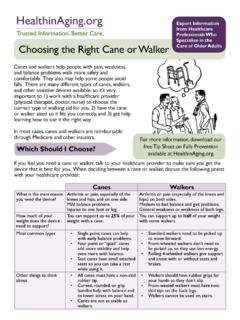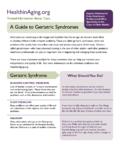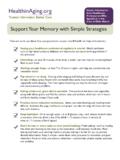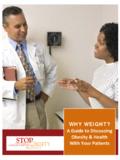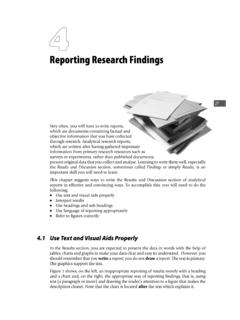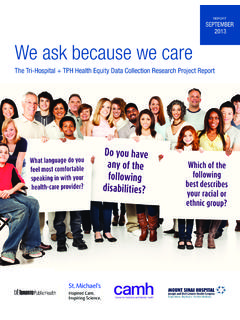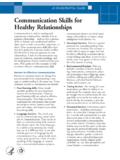Transcription of Top Tips for Discussing When it’s Time to Stop Driving
1 Expert Information from Healthcare Professionals Who Specialize in the Care of Older Adults Top Tips for Discussing When it's Time to Stop Driving As someone you care for ages, you may become worried about their ability to continue to drive safely. Some people can drive competently well into their 80's and even beyond, while other people may have difficulties in their 60's or even younger. When you're responsible for an older adult's safety, you may wonder when it's appropriate to start talking about how safe they are behind the wheel. Your first step in this process is to observe them while Driving . The following situations can indicate possible Driving problems: Getting lost, even when Driving short, familiar routes It's important not to Failing to obey traffic signs or signals comment on or to C utting off other drivers, straddling lanes, or making criticize the older driver's wide turns behavior during the drive.
2 Reacting slowly to emergencies Instead, have a chat once you're both out of the car, Falling asleep behind the wheel or appearing inattentive and review any problems Becoming easily angered or agitated you observed. Be sure not Using poor judgment, such as not yielding right-of-way to sound judgmental or angry. Just calmly state F orgetting to use mirrors or turn signals or check for any unsafe actions you blind spots witnessed. Be specific. Having trouble judging distances If you observe that the older driver had problems like the ones mentioned above, consider taking these steps: Take them to see A healthcare professional can tell you whether the older adult is physically able their healthcare to drive safely. The provider can also advise you as to whether the older adult is provider for a taking any medications that could affect their ability to drive safely.
3 Check-up. Get their An eye care professional, such as an optometrist or an ophthalmologist, should vision tested. test the older driver's vision to make sure they are visually able to drive safely. The best person for this is typically a qualified Driving instructor or an Have a professional occupational therapist who specializes in elder Driving issues, says C. T. Scialfa, evaluate the older PhD, and Emeritus Professor of Psychology at the University of Calgary in adult's Driving skills. Alberta, Canada. Recently, Dr. Scialfa published a study about older drivers and safety in the Journal of the American Geriatrics Society. Know when to have Ask yourself: Do you feel comfortable letting the older adult drive you the conversation. somewhere? The answer may be a signal that it is time to start the conversation.
4 Enlist support. Talk to others in the older driver's circle. Ask them if they share your concerns about the older adult's ability to drive safely. Rehearse the discussion with them so you can be calm and caring. Depending on the circumstances, you may even want one or more of them to be present when having the conversation with the older adult about Driving . Make it a compassion- You don't want to make the older adult feel like everyone is ganging up on ate conversation. them, so make certain to frame the conversation in a supportive, concerned way. Don't let your anxiety or fear about having this conversation let you sound angry. Discuss specifics, but Explain to the older adult why you're worried about their Driving . Cite examples: avoid blame. Dad, you went right through a stop sign last time we drove together.
5 And you forgot to use your turn signals. Or, You got lost on the way to the supermarket.. Be prepared for their A healthcare professional can tell you whether the older adult is physically able anger. to drive safely. The provider can also advise you as to whether the older adult is taking any medications that could affect their ability to drive safely. Schedule time for If the older adult resists what you're saying or gets agitated, gently end the another talk. conversation. Let them take in what you've said, then revisit the topic a day or two later. Ask for their opinion. Make sure to take the time to hear what the older person thinks about their Driving ability. Ask them how secure they really feel behind the wheel. It's very possible that if you've noticed problems, they have too, and may feel vulnerable.
6 Enlist the older If the medical professionals and the Driving instructor you consulted agree that driver's sense of it's time for the older adult to stop Driving , appeal to their sense of responsibility. responsibility. Remind the older driver that they're not the only one at risk. They could potentially injure others or worse should they have a crash. Ask them to think about how they would feel if they were to cause an injury. DISCLAIMER: This information is not intended to diagnose health problems or to take the place of medical advice or care you receive from your physician or other healthcare provider. Always consult your healthcare provider about your medications, symptoms, and health problems. January 2017. 2017 Health in Aging Foundation. All rights reserved.
7 This material may not be reproduced, displayed, modified, or distributed without the express prior written permission of the copyright holder. For permission, contact
